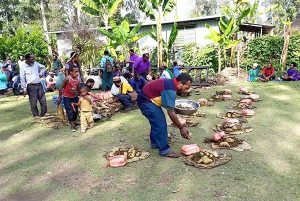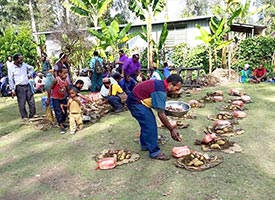By Roger Drinnon
A catastrophic trifecta of flooding, drought, then frost throughout this year in Papua New Guinea (PNG) has severely decimated the nation’s crops, leaving many people starving — and if projections hold true, the worst is yet to come.

LCMS Disaster Response has allocated an initial $16,500 of its available funds for the Synod’s immediate effort to assist amid the crisis, which affects the LCMS partner church in PNG, Gutnius Lutheran Church. The money will be used for food and other basic necessities in the aftermath of the devastating series of events.
“This is about serving and caring for people who are in great need right now,” said the Rev. Ross Johnson, director of Disaster Response for the LCMS Office of National Mission. “This bizarre series of weather phenomena has devastated the food supply of these agrarian people who rely mostly on their own crops, and the lack of clean drinking water also greatly afflicts them.”
Johnson said the initial disaster-response funds will help women, children and elderly people in PNG who now “live on the fringes of hardships and human need.”
Reuters reports that severe flooding and drought brought on by stronger-than-normal El Niño phenomena this year decimated staple crops throughout the country’s highlands, affecting nearly a million people. Up to 80 percent of the population reportedly relies on subsistence farms to live, with little or no income to purchase food beyond what families are able to grow to survive.
Even if rains return in November as meteorologists predict, the food shortage could remain well into 2016, since new crops must be grown. Yet another threat looms in the form of bugs that devour planted seeds for the kakau (sweet potato), a staple food source for the people of PNG.
“The extensive drought in some regions has made it easier for a certain insect to enter the sweet potato mounds,” said the Rev. Lawrence Matro, LCMS area director for the Oceania mission region. “Some are saying that this could take years to eradicate.”
“Having lived for 17 years among the Enga people, who are reported to have been most directly affected by the drought, frost and insects, I can say this disaster is one of the worst in modern history,” said the Rev. Dr. Otto C. Hintze Jr., one of the first LCMS missionaries to PNG following World War II. “It takes nine months for sweet potato vines to produce food to eat.
Together, the frost, drought and insects that eat the seed plantings underground pose an ongoing problem in the months ahead.”
Hintze is the author of a new book, From Ghosts to God in Enga Land, which chronicles the Synod’s early mission work in Papua New Guinea. (See related story.)
Matro said he is hearing reports that children have died from hunger and from drinking contaminated water.
“The Enga people are survivors. They have had frost damage in the past. But, I am told that this is one of the worst that they can ever remember,” said Matro. “People have died and more may be dying. The LCMS disaster response will provide some basic food — rice, tinned fish and cooking oil — that will be distributed to Lutheran pastors and evangelists in the affected areas. It is the intention for these men to remain in the congregations and offer Word and Sacrament ministry to their flock.”
“Pray that it will rain again soon and that insects will not destroy the seed plantings and that the water supply for everyone will be sufficient again,” said Hintze. “Only God can aid in such a disaster of this magnitude.”
Roger Drinnon (roger.drinnon@lcms.org) is manager of Editorial Services for LCMS Communications.
Posted Oct. 2, 2015
